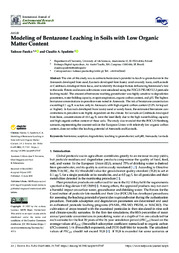Modeling of bentazone leaching in soils with low organic matter content.
Modeling of bentazone leaching in soils with low organic matter content.
Author(s): PASZKO, T.; SPADOTTO, C. A.
Summary: Abstract: The aim of this study was to estimate bentazone´s potential to leach to groundwater in the Arenosols developed from sand, Luvisols developed from loamy sand or sandy loam, and Luvisols or Cambisols developed from loess, and to identify the major factors influencing bentazone´s fate in the soils. Potato and maize cultivations were simulated using the FOCUS PELMO 5.5.3 pesticide leaching model. The amount of bentazone reaching groundwater was highly sensitive to degradation parameters, water-holding capacity, evapotranspiration, organic carbon content, and pH. The highest bentazone concentrations in percolate were noted in Arenosols. The risk of bentazone concentration exceeding 0.1 µg/L was low only in Arenosols with high organic carbon content (3.0% for topsoil or higher). In Luvisols developed from loamy sand or sandy loam, the estimated bentazone concentrations in percolate were highly dependent on the climate. In Luvisols or Cambisols developed from loess, concentrations of >0.1 µg/L were the least likely due to the high water-holding capacity and high organic carbon content of these soils. The study also revealed that the FOCUS Hamburg scenario, representing the coarsest soils in the European Union with relatively low organic carbon content, does not reflect the leaching potential of Arenosols and Luvisols.
Publication year: 2022
Types of publication: Journal article
Keywords: Arenosol, Arenosols, Bentazona, Bentazone, Degradation, Degradação, Leaching, Leaching to groundwater, Lixiviação, Luvisol, Luvisols, PH do solo, Soil pH, Solos, Sorption, Sorção
Observation
Some of Embrapa's publications are published as ePub files. To read them, use or download one of the following free software options to your computer or mobile device. Android: Google Play Books; IOS: iBooks; Windows and Linux: Calibre.
Access other publications
Access the Agricultural Research Database (BDPA) to consult Embrapa's full library collection and records.
Visit Embrapa Bookstore to purchase books and other publications sold by Embrapa.

